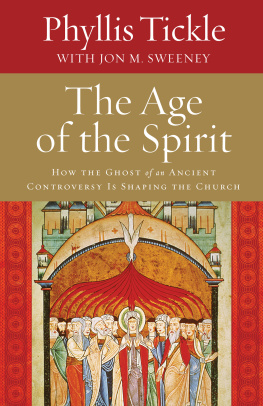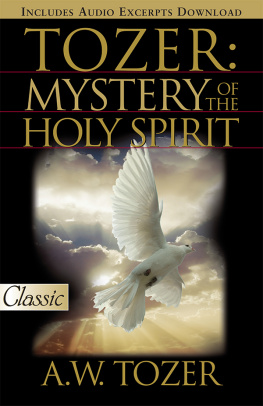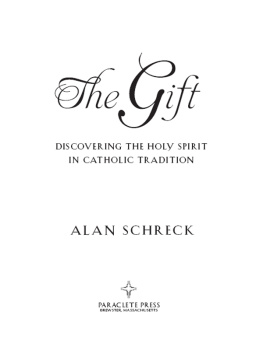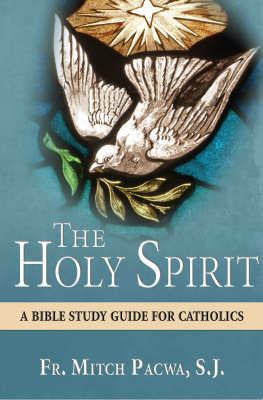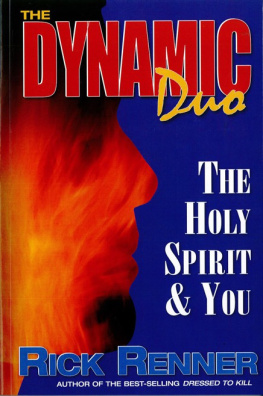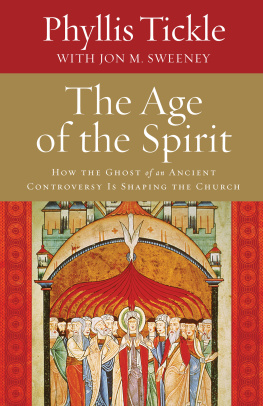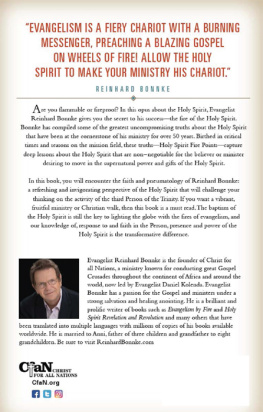
2014 by Phyllis Tickle and Jon M. Sweeney
Published by Baker Books
a division of Baker Publishing Group
P.O. Box 6287, Grand Rapids, MI 49516-6287
www.bakerbooks.com
Ebook edition created 2014
All rights reserved. No part of this publication may be reproduced, stored in a retrieval system, or transmitted in any form or by any meansfor example, electronic, photocopy, recordingwithout the prior written permission of the publisher. The only exception is brief quotations in printed reviews.
Library of Congress Cataloging-in-Publication Data is on file at the Library of Congress, Washington, DC.
ISBN 978-1-4412-4548-9
Unless otherwise indicated, Scripture quotations are from the New Revised Standard Version of the Bible, copyright 1989, by the Division of Christian Education of the National Council of the Churches of Christ in the United States of America. Used by permission. All rights reserved.
Scripture quotations labeled KJV are from the King James Version of the Bible.
Scripture quotations labeled NIV are from the Holy Bible, New International Version. NIV. Copyright 1973, 1978, 1984, 2011 by Biblica, Inc. Used by permission of Zondervan. All rights reserved worldwide. www.zondervan.com
Scripture quotations labeled NKJV are from the New King James Version. Copyright 1982 by Thomas Nelson, Inc. Used by permission. All rights reserved.
Like most Christians, I live in a state of denial about the Trinity. Since I cannot explain it, I do not think about it very much. After reading this book, I cannot stop thinking about it. Where did belief in the Trinity come from? Why has it been such a contentious article of faith? How does it affect Christians in their relationship with those of other faiths? Why is the Holy Spirit so hard to institutionalize and why is that such good news? Tickle and Sweeney know why all of these questions matter. They furthermore know how to write about them so that they matter to us too. If you want to know more about what is happening to Christian faith and whyand if you are also wiling to discover what it means to love God with your whole mind this is the book for you.
Barbara Brown Taylor, author of Learning to Walk in the Dark
Phyllis Ticklethis time ably assisted by Jon M. Sweeneycontinues to document the emergence of a new church, and always with a keen eye to whats gone before. Attentiveness to the Holy Spirit, which this book has in spades, will surely be a hallmark of the next epoch of Christianity. Herein, the ancient and the postmodern walk down the aisle, wedded once and for all.
Tony Jones, theologian-in-residence at Solomons Porch and editor of Phyllis Tickle : Evangelist of the Future , tonyj.net
If we were all students, and Phyllis Tickle and Jon Sweeney were our history teachers, wed all be passionate about understanding our past. If they were our theology teachers, wed all be fascinated to more deeply contemplate the Trinity in the present. And if they were our spiritual directors, wed be turning our hearts, day by day, to being more guided and empowered by the Spirit to move joyfully into the future. Here is a book that instructs and delights, so this bright possibility can become a reality.
Brian D. McLaren, author/speaker/activist, brianmclaren.net
When two scholars as eminent as Phyllis Tickle and Jon Sweeney team up to write a book about the most dangerous leg of the Trinity, the Holy Spirit, I would offer a simple but sincere directive: take and read. You will understand why the Great Emergence is indeed upon us, and why God the Spirit is again brooding over the face of the muddy waters of a church that has forgotten where it came from, where it is going, and to Whom it belongs.
Rev. Dr. Robin R. Meyers, senior minister of Mayflower Congregational UCC, Oklahoma City; Distinguished Professor of Social Justice at Oklahoma City University; and author of The Underground Church : Reclaiming the Subversive Way of Jesus
To read Phyllis Tickle is to engage thoughtfully with the fundamental question of religion: what is God and how can a mere human recognize Gods presence within the worlds noisy clamor? This book is simultaneously rich in scholarship and personally accessible as it explores the nature of spirit with an eye to the enormous challenges of our time. I found it both thought-provoking and moving.
T. M. Luhrmann, author of When God Talks Back
Contents
Cover
Title Page
Copyright Page
Endorsements
The Back Story
Part 1: Holy Ideas in Unholy Conflict
1. Beginning at the Beginning
2. An Ancient Conversation in Our Shifting Times
3. The Great Enigma
4. The Great Enigma and Our Grandest Heresy
5. Meetings of the Minds
6. A Confusion of Creeds
7. A Tintack and the Mighty Machine
8. The Conversation Redux
Part 2: Matters of the Spirit
9. Credo : A Most Dangerous Word
10. Breath, Bread, and Beards
12. Joachim of Fiore and the Dawning of a New Age
13. The Agency of Change
14. Enter the Followers of the Prophet Muhammad
15. The Simmering Pot
16. Steam Rising
The Front Story
Appendix A: Other Major Heresies
Appendix B: The Ecumenical Councils
Appendix C: Some Informing Differences between Western and Eastern Christian Practice
Appendix D: A Few Words from the Greek
Index
About the Authors
Back Ads
Back Cover
The Back Story
The story you are about to read has a back story. Thats certainly not unusual. Almost every tale, whether good or bad, has a story behind the story. Its just that some of those stories are more interesting than others. This particular one of ours, however, happens to be not only interesting but also pertinent. It is so very pertinent, in fact, that we must begin by telling it before we get on with the business of telling our central story of the Spirit and this age in which we live.
The story behind our intended story is hardly an unknown one, despite its being labeled as back. That is, most people in Western or westernized cultures are, to some greater or lesser extent, aware that we who live in the twenty-first century are passing through unusual timesthat, indeed, we are passing through almost unprecedented times of change and shift, upheaval and reconfiguration. But while our particular shifts and upheavals may indeed be particular, many of us also know that the timing of their arrival and the generally chaotic nature of their presence are not. Rather, the very appearance of such an era as ours is, historically speaking, right on time.
Five hundred years ago, the peoples and cultures of the latinized world slugged their way through the horrors and glories of the Great Reformation . As a time of enormous and precipitous change, the Great Reformation gave the world, among other things, the cultural and intellectual reconfigurations of humanism, the political consequences of a new construct now known as the nation-state, the disorienting and very consequential new social structure of a middle class in a culture where no such thing had ever previously been before, and the economic tsunami of a new way of doing business called capitalism, etc. In the course of all of that, and because religion never floats free of the culture in which it exists and which it informs, the Great Reformation also gave the latinized world that thing we now know as Protestantism or Protestant Christianity.
Similarly, one can look back a thousand years from our twenty-first century and discover, with no effort at all, the Great Schism of the eleventh century, with its devastating severance of East from West and of Eastern ways from Western ones in every part of life, including the eviction of Orthodox Christianity from the Western experience and the establishment of Roman Catholicism up out of what had, for half a millennium, been monastic and/or episcopal and/or Mediterranean Christianity.

